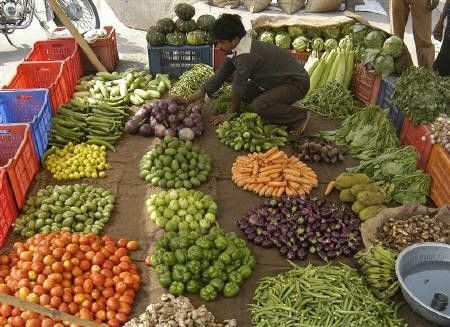Govt ducks big decisions on food inflation

The embattled Congress-led coalition government failed to announce major policy decisions on Thursday to tackle soaring food prices after days of wrangling, taking only minor measures seen as unlikely to make a major impact.
The government announced a review of the import and export of essential commodities, dashing expectations it could ban the export of wheat products or futures trading in some commodities to tame food prices that rose 16.91 percent in 2010.
It was the latest case of Prime Minister Manmohan Singh's government avoiding unpopular but potentially necessary steps.
Governments around the world have been taking measures to tackle soaring grain prices and head off social unrest, with north African countries Libya, Algeria and Morocco cutting taxes on foods or regulating prices and stepping up supplies.
India has the highest food inflation of any major Asian economy, but other emerging markets such as China and Brazil are also battling double-digit food price rises.
The government said in a statement it had contracted the import of 1,000 tonnes of onions and would step up purchases of essential commodities such as edible oils and lentils, and create a panel to recommend ways to fight inflation.
Analysts questioned whether the measures went far enough to tame prices, after days of fractious meetings between the ruling Congress party and a major ally over who should be held responsible for the increases.
Looking at these measures, the government appears helpless. It literally has thrown up its hands. For the past one year officials have been saying prices will come down, said Paranjoy Guha Thakurta, a political economist.
The government has already taken a series of steps from banning onion exports to putting the pending export of 500,000 tonnes of sugar under review, but food inflation has remained stubbornly high despite policymakers' forecasts of a slowdown.
Officials have blamed unseasonal rains and supply bottlenecks for high prices that have put pressure on a beleaguered coalition already battling multi-billion dollar corruption cases and an emboldened opposition.
The government is widely criticised for failing to implement reforms such as allowing foreign investment in multi-brand retail and modernising distribution networks to tackle infrastructure bottlenecks.
Government will review import and export of all essential commodities on a regular basis and impose controls on exports and ease restrictions on imports, including tariff reduction where necessary, to improve domestic supplies, a statement said.
Food inflation has eased marginally from a one-year peak but remained high enough to keep pressure on annual headline inflation in December and reinforce expectations of an interest rate rise this month.
World food prices hit a record high in December after adverse weather affected crops, the U.N. food agency said in a report that raised concerns about inflation, protectionism and social unrest -- factors in the 2008 food crisis.
Rising prices of basic foodstuffs like onions could threaten the Congress party's chance in elections in states like West Bengal and Tamil Nadu that are key for Singh's coalition to keep a majority in parliament.
SOME RELIEF FOR GOVERNMENT?
India's food price index rose 16.91 percent, driven mainly by high vegetable prices, in the year to Jan. 1, government data on Thursday showed.
The figures may signal some relief to the government.
I do see the beginning of an easing trend in weekly inflation, especially since the spike was caused by onion prices and that seems to be easing now with the arrival of fresh supplies, said N. Bhanumurthy, economist with the Delhi-based National Institute of Public Finance and Policy think-tank.
The wholesale price index , the most widely- watched gauge of prices in India, rose 7.48 percent in November from a year earlier, compared with 8.58 percent in October.
Monetary policy is generally seen as ineffective in tackling supply-led inflation in food. However, the Reserve Bank of India is widely expected to tighten policy in its Jan. 25 review as food inflation has spilt over to the broader economy.
India's central bank, which raised interest rates six times in 2010, is expected to increase rates by at least 25 basis points on Jan. 25, a Reuters poll showed on Wednesday. Analysts forecast rates to rise 75 basis points in 2011.
© Copyright Thomson Reuters 2024. All rights reserved.




















